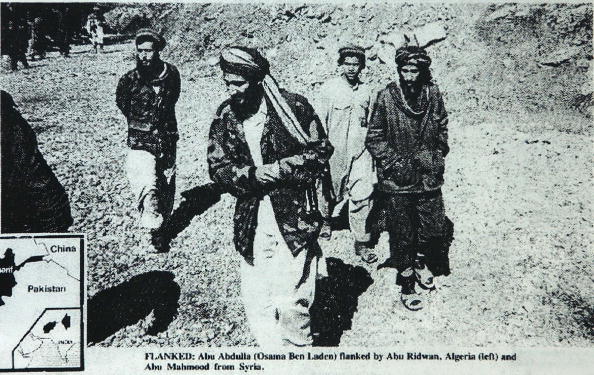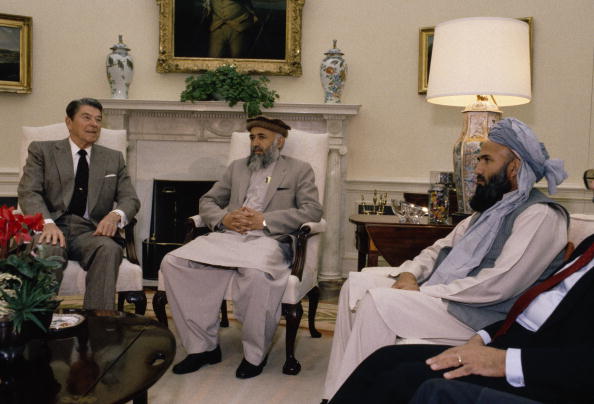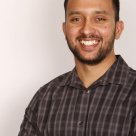Donald Trump Jr. has become the latest figure to highlight missing Saudi journalist Jamal Khashoggi‘s ties with former al-Qaida leader Osama bin Laden, when bin Laden was a guerrilla fighter in Afghanistan in the late 1980s.

Khashoggi, a Washington Post contributor and outspoken critic of the Saudi establishment, has been missing since Oct. 2 when he visited the Saudi consulate in Istanbul.
He is widely presumed dead, with Turkish sources stating that he was killed by Saudi operatives working at the behest of Crown Prince Mohammed bin Salman.
U.S. President Donald Trump on Saturday threatened “severe punishment” against Saudi Arabia if comes to light that the conservative kingdom’s rulers killed Khashoggi.
WATCH: Trump says there would be ‘severe punishment’ if Saudis behind Khashoggi disappearance

But earlier Saturday morning, President Trump’s eldest son shared a Twitter exchange between Patrick Poole, national security correspondent for conservative news site PJ Media, and Sean Davis, co-founder of conservative online magazine The Federalist, which appeared to cast aspersions on Khashoggi’s reputation as a liberal dissident and critic of conservative Saudi Arabia.
Poole tweeted images of a 1988 article published by Khashoggi in the Arab News, in which he was pictured posing with Arab mujahideen (guerrilla fighters) then fighting alongside Afghans against the Soviet Union.
Osama bin Laden was also photographed and prominently featured in the article, which profiled him and the other so-called “Arab Afghans” fighting the Soviets.

Poole said the article showed that Khashoggi is “just a democrat reformer journalist holding a RPG with jihadists.”
Davis then waded into the conversation, sarcastically remarking: “Huh. It’s almost like reality is quite different than the evidence-free narratives peddled by media with a long history of cooperating with or getting duped by Iran echo chamber architects.”
Davis’ take was then retweeted by Trump Jr.
https://twitter.com/seanmdav/status/1050813590100475905
Neither Poole, Davis nor Trump Jr. mentioned that the Afghan mujahideen’s resistance against the Soviets is widely believed to have been funded by the U.S., as has been reported by news outlets such as the BBC, think-tanks like the Council on Foreign Relations and academic publications from the likes of George Washington University, among other sources.

However, that Khashoggi and bin Laden knew each other is no secret — Khashoggi is credited as being one of the first Arab reporters to profile bin Laden, who personally invited the young journalist to Afghanistan to report on the resistance against the Soviet occupation, according to the Washington Post.
READ MORE: Why the case of a missing journalist is prompting international backlash against Saudi Arabia
In the book “The Looming Tower: Al-Qaeda and the Road to 9/11“, New Yorker journalist Lawrence Wright wrote that although Khashoggi was covering the war against the Soviets as a journalist, he was clearly sympathetic to the cause and shared bin Laden’s passion for it.
However, Khashoggi is said to have fallen out with bin Laden over what he saw as the needless continuation of war in Afghanistan even after the defeat of the Soviets, and bin Laden’s designs beyond Afghanistan.
WATCH: Video establishes timeline of Jamal Khashoggi’s disappearance

In 1995, bin Laden’s family asked Khashoggi to interview Osama and get him to publicly denounce violence, in the hopes that this would pave the way for his return to Saudi Arabia and reconciliation with his family as well as the country’s ruling family, according to a chapter in The Looming Tower.
Khashoggi traveled to Sudan to meet bin Laden, but bin Laden refused to back down from his new mission of fighting Americans in the Arabian Peninsula.
Khashoggi reportedly pleaded with bin Laden, saying, “Osama, this is very dangerous. It is as if you are declaring war. You will give the right to the Americans to hunt for you,” and telling him that if he continued his ways, every Saudi person would renounce ties with him and refuse to even be seen with him.
However, bin Laden remained steadfast about his desire to fight the Americans, and Khashoggi was forced to give up and leave Sudan the following day.
READ MORE: Osama bin Laden’s son Hamza reportedly marries daughter of 9/11 hijacker
Many years later, in 2002, Khashoggi wrote an article in Lebanese newspaper The Daily Star in which he explained why he supported bin Laden in the war against the Soviets but disagreed with him over international terrorism activities:
“When Arab (especially Saudi) volunteers first went to fight in Afghanistan in the mid-80s, that campaign was politically and religiously correct. Afghan Muslims were confronting foreign aggressors who imposed communism upon them.”
He then proceeded to attack bin Laden and other Saudis who overstayed their welcome in Afghanistan, and adopted terrorism-driven beliefs that ultimately resulted in acts of violence such as the 9/11 attacks.
“Osama bin Laden’s hijacked planes not only attacked the Twin Towers of the Word Trade Center and the Pentagon. They also attacked Islam as a faith. They attacked the values of tolerance and coexistence that Islam preaches.”
He concluded the article by writing, “The most pressing issue now is to ensure that our children can never be influenced by extremist ideas like those 15 Saudis who were misled into hijacking four planes that fine September day, piloting them, and us, straight into the jaws of hell.”
WATCH: How a Saudi dissident vanished in plain sight

Peter Bergen, author of the book “The Osama bin Laden I Know,” told the Washington Post that Khashoggi was likely sympathetic to moderate Islamist movements such as the Muslim Brotherhood as a young man, but later grew to adopt a liberal and secular perspective which informed his scathing criticisms of the Saudi government.
Some journalists who worked with Khashoggi say that regardless of his beliefs about the war against the Soviets, his proximity with bin Laden was borne of journalistic necessity.
“He was getting into trouble all the time because of his connections with al-Qaida groups, but he was doing that as a journalist,” Jordanian journalist Salameh Nematt, who was Khashoggi’s editor at Al-Hayat newspaper, told the Washington Post.
“He was very well linked, to the point where some people suspected he was financing extremist groups. I personally was convinced he was doing his job as a journalist and covering both sides.”




Comments